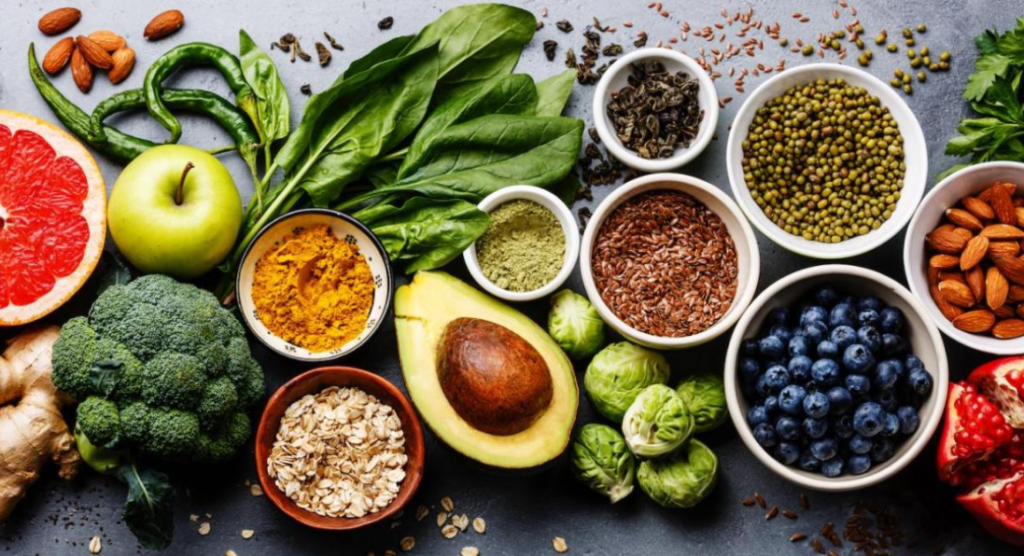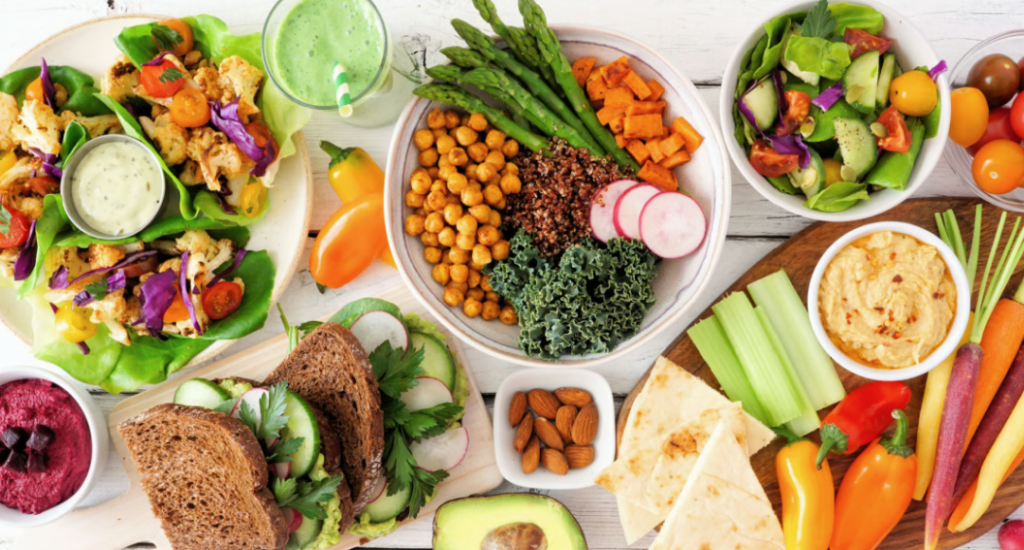Table of Contents
Introduction:
A plant-based diet has garnered increasing attention for its potential health benefits, encompassing a wide array of foods derived from plants such as fruits, vegetables, whole grains, nuts, seeds, and legumes while minimizing or excluding animal products. This dietary approach has gained popularity not only for its environmental sustainability but also for its impact on overall health and well-being. Research suggests that a plant-based diet can reduce the risk of chronic diseases, promote weight loss, and improve overall quality of life. Understanding the key components and benefits of a plant-based diet can empower individuals to make informed decisions about their health and dietary choices.
The Foundation of Well-Being: Understanding Plant-Based Nutrition

You May Also Like: Reclaiming Vitality: The Potent Impact of Detoxifying Foods on Body Cleansing
At the heart of a flourishing lifestyle lies the foundation of well-being, and understanding the nuances of plant-based nutrition can serve as a cornerstone in this pursuit. Embracing a diet rich in plant-derived foods offers not only a pathway to vibrant health but also holds the promise of sustainable nourishment for both individuals and the planet.
Delving into the intricacies of plant-based nutrition unveils a plethora of nutrients, antioxidants, and phytochemicals uniquely abundant in fruits, vegetables, whole grains, nuts, seeds, and legumes. By comprehending the synergistic interactions of these components within a plant-based framework, individuals can harness the power of food as medicine to cultivate vitality and resilience. This exploration not only illuminates the nutritional prowess of plants but also underscores their role in fostering holistic well-being, transcending mere sustenance to nurture flourishing lives.
Fueling Vitality: Key Nutrients in a Plant-Based Diet
Fueling vitality through a plant-based diet hinges on an understanding of the key nutrients abundant in plant-derived foods. These nutrients form the bedrock of health and vitality, offering a diverse array of benefits that contribute to overall well-being. Essential vitamins such as vitamin C, found in citrus fruits and leafy greens, and vitamin E, abundant in nuts and seeds, bolster the immune system and protect against oxidative stress. Meanwhile, minerals like iron, calcium, and potassium, plentiful in leafy greens, legumes, and fortified plant-based products, support vital bodily functions including oxygen transport, bone health, and electrolyte balance.
Moreover, plant-based foods are rich reservoirs of dietary fiber, essential for digestive health, satiety, and blood sugar regulation. Omega-3 fatty acids, found in flaxseeds, chia seeds, and walnuts, offer anti-inflammatory properties crucial for cardiovascular health and cognitive function. Phytonutrients such as flavonoids and carotenoids, abundant in colorful fruits and vegetables, exhibit antioxidant and anti-inflammatory effects, conferring protection against chronic diseases.
Understanding and harnessing these key nutrients in a plant-based diet not only fosters vitality and resilience but also empowers individuals to optimize their health and well-being naturally. By incorporating a diverse array of plant foods rich in these essential nutrients, individuals can fuel their vitality and thrive on a foundation of plant-powered nutrition.
Healing from Within: Plant-Based Foods and Disease Prevention

Healing from within begins with the transformative power of plant-based foods in disease prevention. Research has underscored the profound impact of plant-centric diets in reducing the risk of chronic diseases, offering a potent shield against ailments that afflict modern society. Fruits and vegetables, brimming with vitamins, minerals, and antioxidants, form the cornerstone of this preventive approach, combatting inflammation and oxidative stress, which lie at the root of many diseases.
Whole grains, legumes, nuts, and seeds further fortify this defense, providing fiber, protein, and healthy fats that support cardiovascular health, regulate blood sugar levels, and promote digestive wellness. The phytonutrients found in plant foods, such as polyphenols and carotenoids, exhibit potent anti-cancer properties, while omega-3 fatty acids from sources like flaxseeds and algae offer protection against heart disease and cognitive decline.
By embracing a plant-based diet rich in diverse, nutrient-dense foods, individuals can harness nature’s healing bounty to prevent and even reverse chronic diseases. This paradigm shift from reactive to proactive health management empowers individuals to take charge of their well-being, fostering resilience and vitality from the inside out. Plant-based nutrition emerges not only as a powerful tool for disease prevention but as a catalyst for holistic healing, nurturing the body, mind, and spirit toward optimal health and vitality.
Sustainable Health: Environmental Benefits of a Plant-Based Lifestyle
Sustainable health thrives in harmony with the environment, and a plant-based lifestyle emerges as a beacon of ecological responsibility. By embracing a diet centered around plant-derived foods, individuals not only nurture their own well-being but also contribute to the preservation of the planet. The environmental benefits of a plant-based lifestyle are profound and far-reaching, offering a sustainable solution to the ecological challenges facing our world today.
Plant-based diets have a significantly lower carbon footprint compared to diets rich in animal products, as they require fewer resources such as land, water, and energy for production. By reducing reliance on livestock farming, which is a major contributor to greenhouse gas emissions, deforestation, and water pollution, plant-based lifestyles mitigate environmental degradation and mitigate climate change.
Furthermore, the cultivation of plant foods tends to be more efficient and less resource-intensive, making it a more sustainable option for feeding a growing global population. By minimizing the ecological strain associated with food production, plant-based diets promote biodiversity, soil health, and conservation of natural habitats.
Embracing a plant-based lifestyle not only nurtures personal health but also serves as a powerful act of environmental stewardship. By making conscious choices to prioritize plant-derived foods, individuals can contribute to a more sustainable future for generations to come, fostering a harmonious relationship between human health and the health of the planet.
Beyond the Plate: Lifestyle Factors for Optimal Health on a Plant-Based Diet

Beyond the plate lies a holistic approach to optimal health on a plant-based diet, encompassing lifestyle factors that extend far beyond mere nutrition. While plant-based foods form the foundation of this lifestyle, other key elements contribute to overall well-being and vitality.
Physical activity plays a pivotal role in supporting health on a plant-based diet, promoting cardiovascular fitness, strength, and flexibility. Regular exercise not only complements the benefits of plant-based nutrition but also enhances mood, reduces stress, and fosters a sense of well-being.
Adequate rest and sleep are essential for overall health and vitality, allowing the body to repair and rejuvenate. Prioritizing quality sleep ensures optimal cognitive function, immune function, and hormone regulation, synergizing with the benefits of a plant-based diet to support holistic wellness.
Stress management techniques such as mindfulness meditation, yoga, and deep breathing exercises offer invaluable tools for promoting mental and emotional well-being. By reducing stress levels and cultivating resilience, individuals can optimize the benefits of plant-based nutrition and enhance their overall quality of life.
Social connections and community engagement are also integral aspects of health and well-being. Cultivating meaningful relationships and fostering a sense of belonging contribute to emotional resilience, social support, and overall happiness, complementing the nourishment provided by plant-based foods.
By embracing a holistic approach to health that integrates physical activity, restful sleep, stress management, and social connection with a plant-based diet, individuals can unlock the full spectrum of benefits for optimal well-being. Beyond the plate, these lifestyle factors synergize to cultivate vitality, resilience, and a flourishing life.
Navigating Challenges: Tips for Success on Your Plant-Based Journey
Embarking on a plant-based journey can be incredibly rewarding, but it may also present its own set of challenges. Here are some tips to help you navigate those challenges and find success on your plant-based path:
- Educate Yourself: Take the time to learn about plant-based nutrition, including which foods provide essential nutrients like protein, iron, calcium, and vitamin B12. Understanding your nutritional needs will help you make informed food choices and ensure you’re getting all the nutrients your body requires.
- Start Slowly: Transitioning to a plant-based diet doesn’t have to happen overnight. Consider gradually reducing your intake of animal products while increasing your consumption of plant-based foods. This gradual approach can make the transition feel more manageable and sustainable.
- Experiment with New Foods: Explore the wide variety of plant-based foods available to you, from fruits and vegetables to whole grains, legumes, nuts, and seeds. Try new recipes and cuisines to keep your meals exciting and satisfying.
- Be Prepared: Stock your kitchen with plant-based staples like beans, lentils, quinoa, brown rice, nuts, seeds, fruits, and vegetables. Having these ingredients on hand will make it easier to whip up delicious and nutritious plant-based meals at home.
- Find Plant-Based Swaps: Experiment with plant-based alternatives to your favorite animal-based foods. For example, try plant-based milk alternatives like almond milk or oat milk, tofu or tempeh instead of meat, and nutritional yeast as a cheesy topping.
- Read Labels: When shopping for packaged foods, make a habit of reading labels to check for animal-derived ingredients. Many processed foods contain hidden animal products, so it’s essential to be vigilant about reading labels.
- Seek Support: Connect with other plant-based individuals for support and encouragement. Join online communities, attend plant-based cooking classes, or find a local plant-based meetup group to share tips, recipes, and resources.
- Listen to Your Body: Pay attention to how different foods make you feel. Everyone’s body is unique, so what works for one person may not work for another. Listen to your body’s cues and adjust your diet accordingly.
- Stay Flexible: Remember that being plant-based doesn’t have to be all or nothing. If you find yourself in situations where plant-based options aren’t available, don’t stress about it. Do the best you can with the options available to you, and focus on making plant-based choices whenever possible.
- Celebrate Your Successes: Celebrate your progress and achievements along the way, no matter how small they may seem. Recognize the positive impact you’re making on your health, the environment, and the welfare of animals by choosing a plant-based diet.
By incorporating these tips into your plant-based journey, you can overcome challenges, stay motivated, and enjoy the many benefits of a plant-based lifestyle. Remember that every step you take toward a more plant-based diet is a step toward better health and a brighter future for yourself and the planet.
Recipes for Wellness: Delicious and Nutritious Plant-Based Meals

Here are three delicious and nutritious plant-based recipes to fuel your wellness journey:
Quinoa and Black Bean Stuffed Bell Peppers:
Ingredients:
- 4 large bell peppers (any color)
- 1 cup quinoa, cooked
- 1 can black beans, drained and rinsed
- 1 cup corn kernels
- 1 cup diced tomatoes
- 1/2 cup diced onion
- 2 cloves garlic, minced
- 1 teaspoon ground cumin
- 1 teaspoon chili powder
- Salt and pepper to taste
- Fresh cilantro, chopped (for garnish)
- Lime wedges (for serving)
Instructions:
- Preheat your oven to 375°F (190°C). Cut the tops off the bell peppers and remove the seeds and membranes.
- In a large skillet, sauté the onion and garlic over medium heat until softened, about 5 minutes.
- Add the cooked quinoa, black beans, corn, diced tomatoes, cumin, chili powder, salt, and pepper to the skillet. Stir well to combine and cook for an additional 5 minutes.
- Spoon the quinoa and black bean mixture into each bell pepper until they are filled to the top.
- Place the stuffed bell peppers in a baking dish and cover with aluminum foil. Bake in the preheated oven for 25-30 minutes, or until the peppers are tender.
- Remove from the oven and garnish with fresh cilantro. Serve with lime wedges on the side.
Chickpea and Vegetable Curry:
Ingredients:
- 1 tablespoon coconut oil
- 1 onion, diced
- 2 cloves garlic, minced
- 1 tablespoon fresh ginger, grated
- 2 carrots, diced
- 1 red bell pepper, diced
- 1 zucchini, diced
- 1 can chickpeas, drained and rinsed
- 1 can coconut milk
- 2 tablespoons curry powder
- 1 teaspoon ground turmeric
- 1 teaspoon ground cumin
- Salt and pepper to taste
- Cooked rice or quinoa (for serving)
- Fresh cilantro, chopped (for garnish)
Instructions:
- In a large pot or skillet, heat the coconut oil over medium heat. Add the onion, garlic, and ginger, and sauté until softened, about 5 minutes.
- Add the carrots, bell pepper, and zucchini to the pot, and cook for an additional 5 minutes.
- Stir in the chickpeas, coconut milk, curry powder, turmeric, cumin, salt, and pepper. Bring the mixture to a simmer and cook for 15-20 minutes, or until the vegetables are tender and the flavors have melded together.
- Serve the chickpea and vegetable curry over cooked rice or quinoa, and garnish with fresh cilantro.
Rainbow Veggie Stir-Fry:
Ingredients:
- 1 tablespoon sesame oil
- 1 red bell pepper, sliced
- 1 yellow bell pepper, sliced
- 1 orange bell pepper, sliced
- 1 cup broccoli florets
- 1 cup snow peas
- 1 carrot, julienned
- 1 cup mushrooms, sliced
- 3 cloves garlic, minced
- 2 tablespoons soy sauce or tamari
- 1 tablespoon rice vinegar
- 1 tablespoon maple syrup or agave
- Cooked rice or noodles (for serving)
- Sesame seeds (for garnish)
Instructions:
- Heat the sesame oil in a large skillet or wok over medium-high heat. Add the sliced bell peppers, broccoli florets, snow peas, carrot, mushrooms, and garlic to the skillet, and stir-fry for 5-7 minutes, or until the vegetables are tender-crisp.
- In a small bowl, whisk together the soy sauce or tamari, rice vinegar, and maple syrup or agave. Pour the sauce over the vegetables in the skillet and toss to coat evenly.
- Continue to cook for an additional 2-3 minutes, stirring constantly, until the sauce has thickened slightly.
- Serve the rainbow veggie stir-fry over cooked rice or noodles, and garnish with sesame seeds.
Enjoy these vibrant and nourishing plant-based meals for a boost of wellness and flavor!
Conclusion:

Recommended: 5 Powerful Kitchen Skills For Healthier Eating
In conclusion, adopting a plant-based diet offers a multitude of benefits for both personal health and the health of the planet. By prioritizing plant-derived foods rich in nutrients, antioxidants, and phytochemicals, individuals can fuel their vitality, prevent chronic diseases, and promote overall well-being. Furthermore, embracing a plant-based lifestyle aligns with principles of sustainability, contributing to environmental conservation and mitigating the impact of food production on the planet.
Navigating the challenges of a plant-based journey requires education, experimentation, and a commitment to holistic wellness. By incorporating diverse plant-based foods, practicing mindful eating, and prioritizing lifestyle factors such as physical activity, rest, and stress management, individuals can thrive on a plant-based diet while enjoying delicious and nutritious meals.
As we continue to explore the interconnectedness of human health and environmental sustainability, the importance of plant-based nutrition becomes increasingly evident. By harnessing the power of plant foods to nourish our bodies and protect the planet, we can cultivate a future where wellness and sustainability coexist harmoniously. Through conscious choices and collective action, we can pave the way toward a healthier, more vibrant world for generations to come.
FAQ:
Q: What is a plant-based diet?
A: A plant-based diet focuses on consuming predominantly or exclusively foods derived from plants, such as fruits, vegetables, whole grains, nuts, seeds, and legumes. It may also include small amounts of animal-derived products depending on individual preferences and variations of the diet.
Q: What are the health benefits of a plant-based diet?
A: Plant-based diets have been associated with numerous health benefits, including reduced risk of heart disease, stroke, type 2 diabetes, certain cancers, and obesity. They are typically high in fiber, vitamins, minerals, and antioxidants, while low in saturated fat and cholesterol.
Q: How can I get enough protein on a plant-based diet?
A: Plant-based sources of protein include beans, lentils, chickpeas, tofu, tempeh, seitan, edamame, nuts, seeds, and whole grains like quinoa and farro. Consuming a variety of these protein-rich foods throughout the day can ensure you meet your protein needs.
Q: What about essential nutrients like vitamin B12 and iron?
A: Vitamin B12 is primarily found in animal products, so individuals following a plant-based diet may need to obtain it from fortified foods like plant-based milk, breakfast cereals, nutritional yeast, or B12 supplements. Iron can be obtained from plant sources such as lentils, spinach, tofu, and fortified cereals, and consuming vitamin C-rich foods alongside iron-rich foods can enhance iron absorption.
Q: Is a plant-based diet suitable for everyone, including children and athletes?
A: Plant-based diets can be suitable for people of all ages and activity levels, including children and athletes, as long as they are well-planned to meet individual nutrient needs. Consulting with a registered dietitian or healthcare professional can help ensure that specific dietary requirements are met.
Q: Are plant-based diets environmentally sustainable?
A: Yes, plant-based diets are generally more environmentally sustainable than diets high in animal products. Plant foods typically require fewer resources like land, water, and energy for production and produce fewer greenhouse gas emissions. By choosing plant-based foods, individuals can reduce their environmental footprint and contribute to sustainability efforts.
Q: Can I still enjoy my favorite foods on a plant-based diet?
A: Absolutely! There are countless delicious plant-based recipes and plant-based versions of classic dishes available. With a little creativity and experimentation, you can continue to enjoy a wide variety of flavorful and satisfying meals while following a plant-based diet.

No Responses